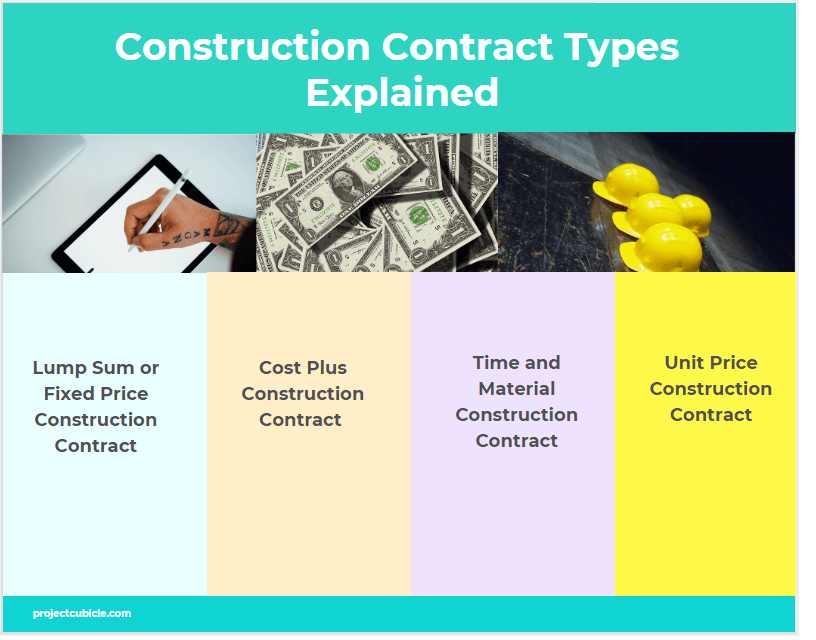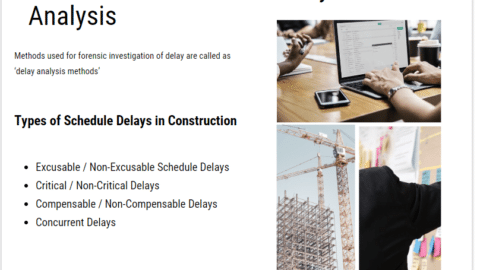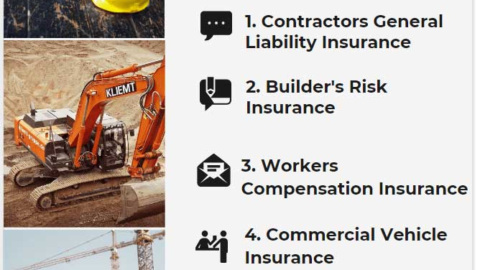Construction Contract Types
A construction contract is a legal agreement between the client and the contractor which involves basic information for the task to be performed by the contractor. In the construction industry, this legal agreement which includes the scope, bill of quantity, drawings, work schedule, and other contract documents, is established between the owner and the builder. Many different types of contracts can be used to define specific terms and requirements for a construction project. However, there are 4 common types of construction contracts widely used by construction and contract managers. Construction contract types typically define the project scope, duration, technical requirements, quality, specifications, payment method, and other important requirements. In this article, we will discuss pros and cons of construction contract types and their key aspects from a construction law point of view.
Table of Contents
Common Types of Construction Contracts
Whether you are building a huge structure or restore an existing facility, a construction project usually involve significant amounts of money transfer between the parties. Depending on the magnitude and complexity of a project significant disputes may arise from various expectations of the parties involved. Construction law aims to resolve the disputes between both contractor and client as they enter into agreements to build a construction.
Whether you are involved in a construction project as a contractor or a client, you must be aware of all of your rights under law in which location you are working. For example, let’s say that you are a builder working in Louisiana, you must understand all of your rights under Louisiana construction law. Before to sign a contract, you must be sure that your rights are protected and the terms are fair for you.
As stated in the first paragraph, there are several types of construction contracts used in the construction industry. Generally, the type of contract depends on the payment method. In other words, the contract type is based on how the disbursement will be made.
Construction Contract Types
Below are the four common types of construction contracts.
1. Lump Sum or Fixed Price Contracts
2. Cost Plus Contracts
3. Time and Material Contracts
4. Unit Price Contracts
Lump Sum or Fixed Price Contracts
In Lump Sum or Fixed Price Construction Contract types, there is a fixed price that will be paid to the contractor for all the scope of work. Contractor commits to complete the work with this fixed price and the client commits to pay this fixed price to the contractor for the completion of work.
Lump sum contracts may include benefits for early delivery of work and sometimes planned costs may be lower than actual costs.
In this contract type, the contractor takes on more risks such as late delivery of work, increased material costs, cost of unclear scope and other potential problems.
Cost Plus Contracts
Cost Plus Contracts include the actual cost which is attributable to the scope of work and a certain amount of profit. Mostly this certain amount of profit can be a percentage of total costs or direct costs.
The most common types of Cost Plus Contracts are below
• Cost Plus Fixed Fee
• Cost Plus Fixed Percentage
• Cost Plus with Guaranteed Maximum Price Contract
• Cost Plus with Guaranteed Maximum Price and Bonus
Cost plus contracts are widely used when the scope has not been described clearly or when the work needs some special technical features. In this contract type usually, the client takes on more risks than a contractor because if the profit rate is a percentage of total costs, it increases as the total costs increase. Therefore Cost Plus Contract type requires more supervision and tracking.
Time and Material Contracts
In this type of contract, the client pays agreed hourly or daily rate for manpower of the contractor and his subcontractors plus the actual costs spent on construction materials. Time and material contract type can be preferred when the project scope is unclear or small.
In this contract type the client takes on more risks because if the duration of the project increases, the project costs increase. In order to minimize the risks, the client may indicate a specific project duration in the contract.
Unit Price Contracts
In this type of contract, every task has a specific price. The client pays the price for the quantity of work the contractor performs. Both the clients and contractors have little risk in this type of contracts. If the unit prices are reasonable, both parties can easily control their costs considering the quantity of work performed. The client can easily verify how much he is being charged and the contractor doesn’t have to worry about wrong estimation for certain activities.
Summary
Construction contracts involve a significant amount of money transfer and risks. Therefore, before to sign a contract, make sure that the contract type is suitable for the situation and terms of the agreement are fair for you. Working with experienced law firms in all types of construction contracts helps you to protect your rights under construction law.
In this article, we analyzed the pros and cons of 4 common types of construction contracts which are Lump Sum or Fixed Price Contracts, Cost Plus Contracts, Time and Material Contracts and Unit Price Contracts. The type of contract depends on the scope and how the payment will be made. In order to avoid losses, the scope of work should be defined clearly and contracts should have enough supporting documents. Note that standard contract forms always expedite dispute resolution.
External References
Associated General Contractors
See Also
Construction Claims Management

Victor Z Young is a Civil Engineer with 35 years of experience working alongside the executive team of various construction companies. Victor specializes in construction insurance, delay analysis, performance analysis and engineering. He holds a Doctor of Project Management from Northwestern University.











Please highlight the troublesome area in concessional contract.